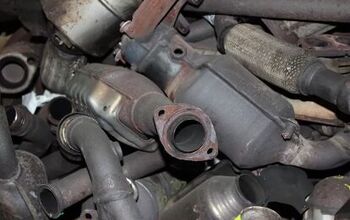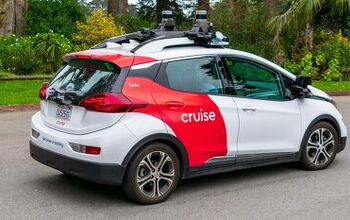Uh-Oh: Trouble Brewing At Daimler And BMW

Will Daimler and BMW be Germany’s Ford and GM? Germany is worried about its two prides and joys: “Some senior executives already question whether Daimler and BMW will survive the crisis as independent companies,” writes Der Spiegel, translation via Business Week. “And close examination reveals that both companies have significant Achilles heels.”
“The biggest risk for BMW stems from its successes in recent years,” writes Der Spiegel. “BMW has almost doubled its car sales since 1999, and since 2007 the Bavarian carmaker has been the world’s top seller in the premium class.” Now, BMW sits on $25b of car loans and leases, backed by cars with increasingly dubious residual value.
Second risk for BMW: Customers, shame on them, buy the wrong cars. Instead of buying big bore 7 and 5-Series Beemers, as they should, customers suddenly insist on smaller models and lesser engines. BMW’s Munich-based engine factory is caught unprepared. “We are producing the wrong engines,” says Manfred Schoch, the chairman of BMW’s works council. Eight-bangers, even six-cylinder engines are piling up unsold. Daimler is even more distressed.
Daimler got hit with a double punch: Even the affluent don’t want to flaunt their wealth in these critical times. The Mercedes truck business has come to a “virtual standstill.” Very often, both big rigs and fancy wheels are sold through the same Daimler-owned dealerships. These days, they are lucky if they sell a car a day. More often than not, it’s a used one “with 3,100 miles on the odometer – but already available at a 40 percent markdown.” Benz suffers the same problem as BMW: They were betting on the bigger models, their A and B class offerings are produced in numbers that are way too small. And, “small car, small profit.”
BMW’s Reithofer and Daimler’s Zetsche have long agreed that they should face the enemy united. For instance, by sharing the cost of developing new entry-level offerings. Reithofer and Zetsche indeed face a common enemy:Their own engineers. At meetings between BMW and Daimler, BMW engineers preach to Daimler that BMW’s technology is best. Daimler engineers answer: “Hey, we invented the car.” Then, in typical German fashion, both groups return to their top management and report that there are just much too many problems. Reithofer and Zetsche may pound the table as much as they want, in the next presentation, they get more problems. If you think South Korea and North Korea have communication problems, then you should be in a meeting between Daimler and BMW engineers. All both companies could come up with was a food co-op for Chinese parts. And even that is going slower than planned. Currently, Daimler and BMW don’t share much more than common pain.
BMW is in a teensy-weensy better position: They have a major share owner, the Quandt family. Sex scandals or not, the Quandts are – so far – faithful to BMW. Daimler’s shares on the other hand are dispersed all over the place. The lower their stock goes, the higher the risk of being taken over, sliced and diced. So what’s in the car(d)s? A merger between BMW and Daimler? A united Korea is more likely. (Which doesn’t mean it can’t happen.)

Bertel Schmitt comes back to journalism after taking a 35 year break in advertising and marketing. He ran and owned advertising agencies in Duesseldorf, Germany, and New York City. Volkswagen A.G. was Bertel's most important corporate account. Schmitt's advertising and marketing career touched many corners of the industry with a special focus on automotive products and services. Since 2004, he lives in Japan and China with his wife <a href="http://www.tomokoandbertel.com"> Tomoko </a>. Bertel Schmitt is a founding board member of the <a href="http://www.offshoresuperseries.com"> Offshore Super Series </a>, an American offshore powerboat racing organization. He is co-owner of the racing team Typhoon.
More by Bertel Schmitt
Latest Car Reviews
Read moreLatest Product Reviews
Read moreRecent Comments
- Slavuta I drove it but previous style. Its big, with numb steering feel, and transmission that takes away from whatever the engine has.
- Wjtinfwb Rivaled only by the Prowler and Thunderbird as retro vehicles that missed the mark... by a mile.
- Wjtinfwb Tennessee is a Right to Work state. The UAW will have a bit less leverage there than in Michigan, which repealed R t W a couple years ago. And how much leverage will the UAW really have in Chattanooga. That plant builds ID. 4 and Atlas, neither of which are setting the world afire, sales wise. I'd have thought VW would have learned the UAW plays by different rules than the placid German unions from the Westmoreland PA debacle. But history has shown VW to be exceptionally slow learners. Watching with interest.
- Ravenuer Haven't seen one of these in years! Forgot they existed.
- Pig_Iron I one of those weirdos who liked these.


































Comments
Join the conversation
50merc, Have a read of http://www.allpar.com/neon/engineering.html Allpar has, shall we say, a bit of bias, but independent sources who dealt with Daimler said similar things: the Germans were always right, Chrysler people were always wrong, and the Chrysler people paid for it. The most interesting bit is how Mercedes actually charged Chrysler consulting fees to screw them up. Amazing. Usually only SAP, PeopleSoft or JD Edwards get to do that kind of thing.
@windswords: Thanks for the link. But I still can't see where all the blame was coming from. First of all, allpar isn't exactly what you'd call an unbiased source. For example, I have read a book about the merger, written from a German point of view (by an insider who was involved at every point of the merger) and it was naturally exactly the opposite. Now I won't claim that this book is right on, actually, I think it's BS. But I think the same about this forum entry by someone who used to work for Chrysler in the early 1990s and who was not involved at the time of the merger. Also, the German media at that time (from 1998 onwards) basically said unanimously that Daimler wasn't hard enough on Chrysler. The reasoning was, that mergers basically never work out, while acquisitions only seem to work when the acquired company is completely dissolved within the acquiring company and its former corporate identity gets wiped out. Secondly, this forum entry is indeed interesting, but I fail to see the major problem. Of course mistakes were made on both sides. And he gives some interesting examples. Most of which could be put down to misunderstanding or bad timing/execution (like the introduction of the new software). But there was nothing earth shattering there, until he gets to the last part where he says that "The terms rape, pillage, and plunder really DO describe the mess that caused probably the most noted destruction of a carline ever", without really saying why. At that point, all his nice examples went to waste, because they in no way justify a conclusion like that. I guess it all comes down to previously held convictions. If you loved Chrysler before the merger, then you'll blame Daimler (and you can find examples that seem to prove your point) otherwise, you may blame Chrysler for the mess they're in now (and you'll also find examples that prove your point). By the way, some of the "facts" don't seem to add up. If the LX paltform was almost done before the Germans came in and it "only" got some Mercedes parts, then why was it introduced in 2005, 7 years (!!!) after the merger? At the point the Germans entered the picture, there were some sketches at best, nothing more. I think there's a lot of wishful thinking going on: Everything good, Chrysler; everything bad, Daimler. It's most definitely not as easy as this. Daimler did its best to turn Chrysler around and when they saw that they couldn't do it, they left, which was the sensible thing to do. Schrempp loved the idea of a world automaker. DaimlerChrysler was his baby and he didn't want to abandon it. He did everything to make it work out (including Mitsubishi). So when it became obvious that Chrysler couldn't be saved, Schrempp had to leave. It basically was an internal DCX revolution that led to the divorce. The revolutionaries refused to further pay for the bottomless pit in Detroit and on their helm was Dieter Zetsche, former Chrysler CEO who was mentioned rather favourably by the poster you linked to and who must have known best what was going on. So it wasn't "raping and pillaging", but rather an expensive settlement with the former trophy wife who got fat and was a drain on the credit card. And another minor detail that leads me to believe that this forum entry has a very narrow field of view is what was written about Bernhard, that he was fired because of some warranty problems with Mitsu. Well, in fact he wasn't fired, but he left because of internal power struggels. In 2004, Mercedes CEO Hubbert retired. Many favoured Bernhard to become his successor, but the Unions were afraid of him and ultimately, Schrempp put his old buddy Cordes in that position. Bernhard felt cheated and left for Volkswagen (where he had a similar fate). When Schrempp had to go, Cordes also left (he was Zetsche's arch enemy). Now Zetsche is both, CEO of Daimler as well as of Mercedes. Had Bernhard endured a little longer, he'd surely be Mercedes CEO now.